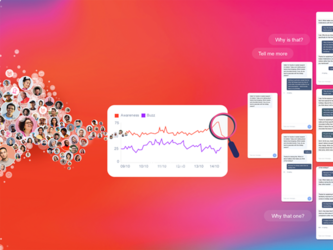Twitter data: misused and misunderstood
Twitter is a social network that attracts millions of people who share their personal opinions about all things important and not important, depending on your perspective. People share their thoughts and opinions about mundane aspects of their daily life, and the brands, products, and services they use, love and hate. On the other side of the coin, brands share their marketing messages, product launches, engagement manoeuvres and more. Twitter is data, lots of data. But Twitter is not a market research tool. Twitter is a data collector and provider.
Trending data is not a research finding. It is a point in time, directional suggestion of the volume of records (not people) that contain the same series of characters. Twitter trends are suggested by tweets and approved for visual display by people. There is nothing scientific about that process. To call this ‘research’ is a gross misrepresentation of the word.
A search result is not a research finding. Yes, you can enter a series of characters into the search box and read through the collection of tweets that the Twitter algorithm has chosen for you to peruse. But is it scientific and generalisable? Absolutely not.
Professional and certified marketing researchers (PRC in the USA, CMRP in Canada) would never confuse Twitter trends, counts, and search results as generalisable, scientifically projectable research results.
A lot of people don’t use Twitter? That’s obviously true. But a lot of people don’t join survey panels, participate in focus groups, respond to individual interviews with marketing researchers, respond to emailed survey invitations, or contribute to a whole host of other massively common research methods that rely on self-selected participation methods. The fact that one set of data, Twitter data in this instance, is not representative of the population of a specified country nor group of people is neither here nor there. Most companies and brand managers rely heavily on, and trust intuitively, the results collected and analysed by professional researchers. Why?
Marketing researchers use their extensive training, knowledge and skills to identify the strengths and weaknesses of any data source they use. They assess potential problems, develop workarounds, specify caveats and guide clients on the most appropriate way to use and interpret research results.
Survey panels rely on volunteers to find and join panels – the opinions from those volunteers lead to thousands of improved products and new products every year. Researchers who use survey panels know how to collect the right data, clean poor quality responses out of the data, and properly analyse the survey data to achieve high quality results.
Twitter data is also volunteer data. And, just like survey data, researchers skilled in social media listening research know how to identify and clean out the spam and irrelevant messages that erroneously boost counts, generate invalid sentiment scores and inaccurately identify topics of interest. Hilarious memes, misleading paid reviewers, and client sponsored marketing messages are common data problems that professional researchers know how to identify and remove. Without a doubt, Twitter trends and counts are ridiculously and unpredictably inflated by these erroneous data.
Marketing researchers know when it is, and is not, appropriate to generalise data from Twitter to other populations. The fact that demographics may not be available is not the issue. Important research goals do not always necessitate the collection of precise demographics from every research participant. For instance, a company may need to know how often their brand is mentioned in comparison to competitive brands. They may need to know which specific sub-brands people do and don’t know how to spell, or whether people feel like talking about the new features of a product and which existing features people never talk about. Marketing researchers have innumerable valid uses for Twitter data. Maybe what you require is a professional researcher.
Annie Pettit is the Chief Research Officer ofPeanut Labs, a company that specialises in self-serve sample.
Reference:
Matthews, Dan. “Proof That Twitter Is A Terrible Market Research Tool.” Forbes. June 3, 2014.

We hope you enjoyed this article.
Research Live is published by MRS.
The Market Research Society (MRS) exists to promote and protect the research sector, showcasing how research delivers impact for businesses and government.
Members of MRS enjoy many benefits including tailoured policy guidance, discounts on training and conferences, and access to member-only content.
For example, there's an archive of winning case studies from over a decade of MRS Awards.
Find out more about the benefits of joining MRS here.













0 Comments